- Home
- Mark Pryor
The Paris Librarian Page 9
The Paris Librarian Read online
Page 9
Nothing.
Behind him, the front door was closed. Didn’t I leave it open? he wondered. He opened it and stepped onto the landing, but it was empty and no sound came from the stairs. Then he heard it, the rattle of the front door to the building as it closed, as if someone was trying to do it quietly.
Hugo took the steps two at a time, his boots slipping on the tile of the landing as he spun to take the lowest flight. He hit the ground floor at a run, crossing the empty foyer as fast as he could. He pulled open the door and stepped out into the street, remembering at the last second to stick his foot back into the building to keep the door from locking him out.
He looked left and right, then across the street, but saw no one he recognized—just half a dozen people alone or in pairs, strolling in the balmy evening. He calculated how long it’d taken him to get there after hearing the noise and chided himself for being too slow, estimating that someone in a hurry could have turned a corner or ducked into a store in the time he’d taken. And with no access key to the building, he had no choice but to abandon the chase. If that’s what it was.
He stepped back into the foyer and took out his phone.
“Camille, it’s Hugo,” he said as soon as the police lieutenant answered.
“Bonsoir,” she said. “You sound out of breath.”
“I’m sorry to bother you, but I think you and your team need to pay a visit to the Seventh Arrondissment again.”
“The library?”
“Not this time. The man who died, Paul Rogers. He lived in a nearby apartment with his girlfriend, Sarah Gregory. I just stopped by there to check on her, and to see Paul’s mother.”
“Are they OK?”
“Sarah’s dead. I don’t know about Paul’s mom, she wouldn’t open the door. Or couldn’t, I don’t know which.”
“Dead? Are you saying she was murdered?”
“She’s in the bath with her wrists slit.”
“She killed herself. Merde, that poor girl.”
“There’s something else,” Hugo said.
“What?”
“I thought I heard someone. I’m sure I left the front door open when I went in, but after I found her, I think someone snuck out of the apartment and closed the door behind them.”
“Are you sure?”
He paused. “Honestly, no. But I stood at the top of the stairs and I’m pretty damn certain someone went out of the building as quietly as possible. The front door makes a racket, but someone closed it with barely a rattle.”
“Hugo, that’s . . .” Her voice trailed off, but Hugo knew what she was thinking. The same thing he’d be thinking if someone had told him all this.
“Look, I get it. But think about this, Camille. Paul Rogers dies, then a day later someone else at the library almost dies, and now Sarah. I’m fine with coincidences up to a point, but this feels wrong.”
Lerens’s voice was gentle. “Paul died of natural causes. Sarah Gregory wouldn’t be the first broken-hearted lover to commit suicide after losing the love of her life. It’s textbook.”
“When I spoke to her, she was wondering how to deal with everything. But she was planning to; I could tell by the way she was talking.”
“Maybe she changed her mind. Maybe it all seemed like too much.”
“Yeah, maybe. But how do you explain the person in her apartment sneaking out?”
“The one you’re not sure exists?” She sighed. “What do you want me to do, Hugo?”
“Get a crime-scene team down here. And break down Madame Rogers’s door if you have to.”
“Fine, I’ll send a team. Sit tight and wait, will you?”
“Sure. But I’m giving your boys five minutes, then I’m breaking down that door myself.”
CHAPTER NINE
The city came back to life the next day.
Hugo left his apartment just before eight in the morning, and he felt the uptick in vibrancy before he reached the end of Rue Jacob. The traffic was busier, too, as he crossed the busy Boulevard Saint-Germain, heading toward the quieter, more residential, Seventh Arrondissment and the American Library.
Claire Rogers had been fine, claimed she was asleep and hadn’t heard Hugo knock. Nor did she remember why she asked him to come and see her. The old woman sat on her couch and cried when Hugo told her, as gently as he could, about Sarah Gregory’s death, shaking her head in disbelief and mumbling quietly to herself. A police counselor had stayed behind with her, to help her to bed and maybe provide some gentle pharmaceutical relief from her distress.
Now Hugo was on his way back to the library. He wanted to deliver the news of Sarah Gregory’s death to the staff himself. Out of common decency, of course, but also because he wondered. Wondered how people would feel, how they might react.
On every street, people leaned out of open windows to clip open their shutters, letting in the morning summer breeze to blow away the vacation dust and stale air. The stores that had been closed on his previous walks to the library were now opening, small trucks idling by the curb as their drivers ran in and dropped off stock for the shelves. He passed the proprietor of a small art shop, a gray-haired man of around fifty wearing blue jeans and a tattered denim jacket over a crisp white shirt, and sky-blue tie. The man lounged in his doorway with a cigarette in his hand, and his voice cracked when he exchanged Bonjours with Hugo.
He headed down Rue Saint Dominique, one of the busier streets that could take him in that direction, a vein of commerce running between the more residential streets. He slowed to read the words on the side of a post-office vehicle that trundled past him: Smile. There could be a love letter for you in this van. The van stopped outside an Irish pub, and as he got close Hugo read the chalkboard out front, proudly advertising the finest burgers and “cocktails of the choice.”
His view opened up as he entered the Esplanade des Invalides. To his left, the green lawns extended to the impressive collection of military and medical buildings, with the chapel dome dominating the long façade. Closer to him, as if intentionally spoiling the view for tourists, a homeless man sat on a park bench, straddling it as he shared a loaf of bread with twenty or so fluttering and cooing pigeons.
As he got close to the library, Hugo took out his phone and called the main number, asking for Nicole Anisse.
“Would you be able to help me with something?” he asked her.
“Sure. But . . . is this Hugo asking, or the police?”
“Just Hugo.”
“For now, anyway, right?” Her voice was light, as if she were making fun of him. Or flirting.
“True. I’m on my way to the library right now, but sometimes I feel like Madame Juneau isn’t wild about having me here.”
“It’s not you she minds, I don’t think. It’s that the police seem to follow you around.”
“She doesn’t like the police?”
“I don’t think any businesses like having the police around, do they?”
“I just wondered if it was something personal with her.”
“Not that I know of.” A pause. “I guess I don’t know her that well, but I don’t think so. So what was the favor?”
“I’m curious about Paul’s account history, books he checked out. Would you have access to his history the same as you would a regular customer?”
“Yes, I think so. I’ll have a look and print it out. When will you be here?”
“About fifteen minutes, if I don’t stop for coffee.”
“See you then.”
She was waiting for him at the circulation desk. As he came in, she gestured for him to follow her to his left, past the conference room, into a space with two desks. She went behind one of them and picked up a manila folder.
“Here. Not very interesting, I don’t think. His check-out history for the past year.”
Hugo pointed to a chair. “May I?”
“Yes, of course.”
“Thanks.” Hugo sat and opened the folder. It took him a moment to sort out the columns and r
ows, orient himself to what the page was saying, but he got there quickly. The book on weapons was the most recent request, not surprisingly. Before that, a string of novels, from science fiction to steampunk to crime fiction. In the middle of the list, a nonfiction title caught Hugo’s eye, checked out about two months ago. The Crime Writer’s Guide to Killing with Poison. He showed Anisse the page. “What’s this notation?”
“It looks like he checked that book out and paid off a late fee at the same time. We often ask our customers to do that, pay any fines while they’re checking books out, so they don’t pile up. It’s a habit we staff members fall into ourselves.”
“Very sensible,” Hugo said. “May I make a copy of these?”
“Keep them, I can reprint if I need to.”
“Thanks. Do you know if Michael Harmuth is here?”
“He wasn’t about twenty minutes ago. Something I can help with?”
“Who’s the senior person here?”
“‘Senior’?” Anisse smiled. “This is a library, not the police or military. But probably Michelle Juneau. I expect she’s in her office—do you know where it is?”
“Yes, thank you.” He waved the papers. “And thanks for these.”
He wandered past the circulation desk, along the side of the stacks, until he reached the short hallway and door into the administration area. He let himself in, tapping the top of the safe as he passed it and wondering idly if an infamous dagger lay within. He knocked on Michelle Juneau’s door.
She looked up from her computer and gestured through the glass panel by her door for Hugo to enter. Her eyes were wary, as if she’d resigned herself to his constant appearances, hoping only that he didn’t bring the police with him. Or bad news. For his part, Hugo knew he was going to disappoint on the latter.
“I’ll get straight to the point, Madame Juneau,” he began, as soon as he’d sat down. “I have some very sad news.”
“Monsieur Tilly?” She leaned forward. “Did he become sick again?”
“No, it’s not about him. It’s about Sarah Gregory. I was at her home yesterday and found her in the bath tub. It looks like she committed suicide, I’m really sorry.”
“Mon dieu,” she said, a hand covering her mouth. “Sarah? She really did that?”
“She’d been very upset over Paul, of course. I can only think that she . . .” Hugo shook his head. “She didn’t want to live without him.”
“That’s terrible. Oh, my goodness, that’s just so terrible.” She sat back in her chair. “One week ago they were both here, both so alive, so happy. And now both are gone. Forever.”
Hugo’s phone buzzed in his pocket. He slid it out and glanced at the screen. “Excuse me a moment, I have to take this.” He stood and stepped out of her office. “Camille, how’re you?”
“Bonjour, Hugo. I suppose you could say that I’m intrigued at this point.”
“What does that mean, exactly?” He turned into the stacks and found a comfy chair at the end, a comforting wall of books on either side of him.
“It means that I have the results of Mademoiselle Gregory’s autopsy.”
“It’s done already?”
“Doctor Sprengelmeyer has a squash tournament to attend, so he started work early today.”
“What did he find?”
“That she died from exsanguination.”
“Yeah, thanks Camille, I could’ve told you she bled to death. You’re not in the habit of calling to state the obvious, so what else?”
“She had a lot of medication in her system, painkillers. And I do mean a lot.”
“That seems pretty consistent with someone who’s just lost their partner, and who’s contemplating suicide.”
“True. And I suppose someone as distraught as she was might also take flunitrazepam, but on the other hand . . . .”
“Are you serious?” He didn’t try to hide the surprise in his voice. Flunitrazepam was also known as Rohypnol, sold as “roofies” to desperate and depraved men who drug women in bars and take them home to assault. The press referred to it as a “date-rape drug” but as far as Hugo was concerned it was a rape drug, with no qualifiers.
“Very. It’s technically a sedative so we have a call in to her doctor to see what she was prescribed.”
“Good.” Hugo thought back to his encounters with her. “She didn’t seem high or out of it in any way when I was at her place.”
“She may have been saving them for the big exit.”
“Glad you’re being thorough.” He hurriedly corrected himself. “I mean, I know you’re always thorough, but . . .”
“I get it.” Lerens chuckled. “You’re glad I’m open to this being more than just suicide.”
“I would expect no less.”
“En fait, there’s a little more to it, I should admit.”
It was Hugo’s turn to laugh. “Come on, Camille, what else?”
“She had some bruising on her chest and neck, her throat.”
“She was strangled?”
“No, not that. It could be from anything, but there are no identifiable patterns or marks consistent with strangulation. Sprengelmeyer said those bruises might be consistent with Sarah being pushed and held down.”
“But it’s not definitive.”
“He said it could simply be evidence of her falling, bumping into something, or maybe rough sex.”
“Bumping into something with her neck?” Hugo said, incredulous.
“Hey, I’m just telling you what Sprengelmeyer said. You can leave the cross-examination to the lawyers.”
“Will you send me the report when he’s finished?”
“If there’s anything criminal, this will be a police matter, Hugo.”
“Ah, the familiar jurisdictional dance.”
Lerens laughed. “I know. I can’t even pretend to pull that stuff with you. Of course I’ll send you the report, and you’re welcome to give me all the opinions you have.”
They disconnected and Hugo walked back into Juneau’s office, leaving the door open behind him.
“You looked worried,” she said. “Everything all right?”
“A little early to say.” He brightened his voice. “My job makes me a worrier, I expect that’s all there is to it.”
She studied him for a moment, then got up and closed the door. When she sat down again, she looked at her hands. “This is going to sound silly,” she began. “It’s just, something’s been bothering me and it’s basically nothing, but with all that’s been going on, Paul and now Sarah, and you with that look on your face . . .”
“What is it?”
“I didn’t say anything to the police because . . . because there’s nothing really to say.”
“Slow down, Michelle, and tell me what’s bothering you.” He gave her a reassuring smile. “If it’s nothing, then there’s no harm. If it’s something, then I probably ought to know.”
“En effet, that’s true.” She took a deep breath. “About a week ago, maybe two weeks now, I was closing up the library. I went down to the basement to make sure all the lights were off.”
“Which staircase did you use?”
“The one behind the circulation desk.”
“OK, go on.”
“Well, I got to the bottom of the stairs and I thought at first all the lights were off. Then I thought I saw light at the far end of the basement.”
“Where the atelier and the rear stairs are?”
“Yes, exactly. Anyway, I looked again and realized it was the light above me reflecting off the side wall because all the other lights were, in fact, off. But then I thought I heard voices, so I turned on more lights.” She looked down for a moment. “I admit, I was a little scared. The basement is cryptlike at the best of times, but at night . . .”
“So I’ve heard,” Hugo said gently. “Did you see anyone?”
“As soon as I turned the lights on, the voices stopped. I didn’t want to go investigate, but it was like I couldn’t help myself. I started
to walk down that way. I kept telling myself either no one was there or it was a staff member who’d lost track of time. I had to check because if it was, I didn’t want to lock them down there.”
“You usually lock the basement at night?”
“We do now, since we keep some valuable books down there, and since there’s only the front and back doors to it, it’s easy to do. And, of course, now we have the Severin collection.” She shivered. “I couldn’t imagine being locked down there overnight, I’d go mad.”
“Tell me what happened then?”
“I called out three or four times, I felt silly because it suddenly seemed like I was alone.”
“No one responded?”
“No, so I kept going. I was looking, too, but didn’t see anyone until I got near the end and then, out of nowhere, he just stepped out in front of me. Just appeared, I guess, from between the stacks. Just like that, he was there. I actually screamed, can you believe it?”
“Who was it? Who was there?”
“I haven’t screamed like that since I was a kid.” She shook her head, as if trying to free herself of the memory. Then she looked up and answered Hugo’s question. “It was Paul. Paul Rogers.”
CHAPTER TEN
Hugo sat back and thought for a moment. It could mean nothing, Paul Rogers in the basement where he liked to write, in the library that he ran. But why hadn’t he responded to Michelle Juneau when she asked if anyone was down there?
“He would have heard you calling out?” he asked.
“He should have. It was quiet, so yes, I’m sure he would.”
“Did he give a reason for being down there?”
“He didn’t need to and I didn’t ask.” She shrugged. “It’s his library. Was.”

 The Book Artist
The Book Artist The French Widow
The French Widow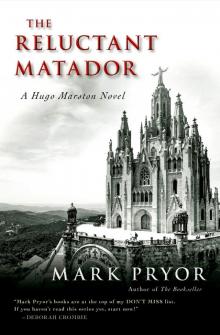 Hugo Marston 04 - The Reluctant Matador
Hugo Marston 04 - The Reluctant Matador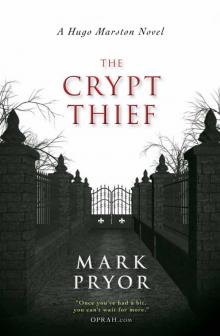 The Crypt Thief
The Crypt Thief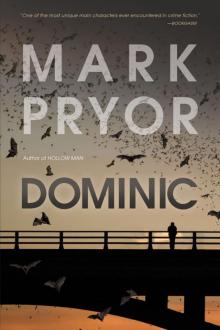 Dominic
Dominic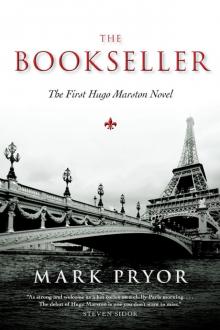 The Bookseller
The Bookseller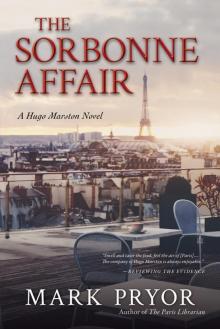 The Sorbonne Affair
The Sorbonne Affair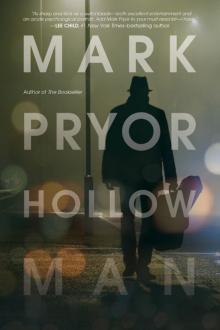 Hollow Man
Hollow Man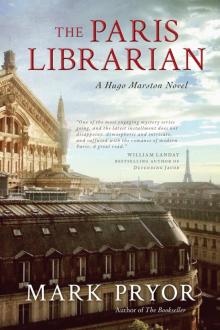 The Paris Librarian
The Paris Librarian